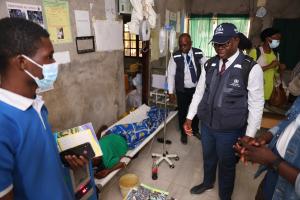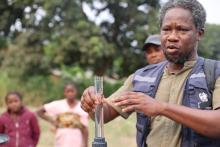Cholera response in Congo: Mbamou Island breathes again
Brazzaville – When Angèle, a young mother living on Mbamou Island, began experiencing abdominal pain a few weeks after giving birth, she thought it was just a minor discomfort. But the symptoms worsened, revealing a cholera infection. "I didn’t understand what was happening to me. The pain started mildly, then became unbearable. I had stomach aches, fever, and felt very weak. I thought it was normal after childbirth. I didn’t think it was an illness."
Since July 26, 2025, the Republic of Congo has been facing a cholera outbreak that has affected over 430 people and caused 34 deaths. The most affected age group is between 15 to 24 years old, and the hardest-hit areas are Mbamou Island, Talangaï in Brazzaville Department, and Mossaka-Loukolela in Congo-Oubangui Department.
Upon the official declaration of the outbreak, the World Health Organization (WHO), working with the government and partners quickly activated its Incident Management System (IMST) and supported the deployment of three multidisciplinary teams to priority areas. These teams helped structure the response, confirm cases, and strengthen national capacities in close collaboration with field actors.
WHO’s support included the delivery of 7 tons of cholera medicines and kits, the establishment of treatment centers in Mbamou, Mossaka, and Talangaï, training of 172 health workers in case management and infection prevention, and the education of 250 community relays on preventive measures. WHO also provided a speedboat to facilitate transport between Mbamou Island and Brazzaville, enhanced surveillance at entry points, and supported the disinfection of 61 wells and several health facilities.
On the ground, health professionals witnessed improvements, thanks to this support. Dr Nelson Bokale, the chief medical officer of Mbamou Island’s health district, recalls the difficult beginning. "For nearly five years, I’ve faced many challenges, but the cholera outbreak response was particularly significant. Before the support arrived, we did what we could with available resources. The arrival of the Surge support team was a turning point. It strengthened our efforts and allowed us to organize a more structured response," he emphasized.
WHO also supported epidemiological surveillance, active case finding, and the setup of water circuits for treatment units. Experts in infectious diseases, logistics, hygiene, water and sanitation, and risk communication were also mobilized. Thanks to these joint efforts, the outbreak’s dynamics have shifted, and indicators are improving. On Mbamou Island in particular, the fatality rate was halved, dropping from 11.7% to 4.8% within two weeks. As of August 15, 2025, of the 12 active cases on the island, 5 are hospitalized while the other 7 are receiving outpatient care.
During a field visit, Dr Vincent Dossou Sodjinou, WHO Representative in Congo, described the progress with optimism. "The trend of the outbreak is declining. Health workers are active, treatment centers are operational, and communities are better informed. We commend the collaboration between the government and WHO, which enabled a rapid and effective response," he stated.
Partner complemented WHO’s efforts by repairing boreholes, distributing water purification tablets to more than 1,300 households, and installing handwashing stations in affected area. Awareness campaigns have since reached thousands of families to strengthen adherence to preventive measures.
Now recovered, Angèle is an advocate and actively involved in community awareness. "I tell everyone in the community that if they have symptoms, they shouldn’t stay home. They should go to the health center for treatment," she says with conviction.
Communications Officer
WHO Regional Office for Africa
Email: dialloka [at] who.int (dialloka[at]who[dot]int)
OMS Congo
Email : mdiawara [at] who.int (mdiawara[at]who[dot]int)
Tél. : +242 05 640 51 52

